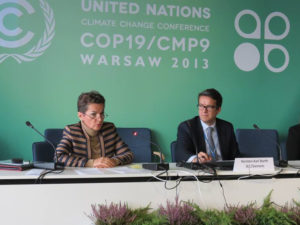
Climate change
ICC urges governments to show bolder steps for a globally effective climate agreement in 2015
The UN Climate Change Conference in Warsaw ended last week keeping governments on a pathway towards a universal climate agreement in 2015.

While ICC has welcomed the decision to cut emissions from deforestation, high levels of uncertainty still remains around ambitions for emissions reductions, how they would be applied and how an agreement would work in practice.
While the Warsaw climate compromise keeps hope for a global climate agreement, ICC said that longer-term predictability and clear market signals were vital to managing the impacts of climate change and to unlocking the role of the private sector as solutions innovator, financier and investor.
“Though there were no extraordinary advances made in Warsaw, steps for an agreement in 2015 were outlined with one major outcome being the Framework for REDD+, which includes a significant set of decisions on ways to help developing countries reduce greenhouse gas emissions from deforestation and the degradation of forests, ” said ICC Secretary General Jean-Guy Carrier.
However, in order to tackle climate change with the required urgency, more must be done to facilitate the transition towards a lower emitting economy, such as more innovative investment channels in mitigation and adaptation initiatives.
But accelerating and scaling up climate solutions at a faster rate also requires more clarity and the right enabling frameworks to level the global playing field, ICC said on behalf of global business. Lack of trust and confidence in the multilateral system has had a detrimental effect on these efforts.
“Businesses are innovating energy- and resource-efficient solutions every day. Companies will continue to be creative and innovate, and ride the waves of major technological change that can transform the world,” said Kersten-Karl Barth, Chair of the ICC Commission on Environment and Energy, and Sustainability Director, Siemens. “We are already witnessing energy transitions and a new industrial paradigm taking hold, triggering a boom in low-carbon technologies. According to one McKinsey report, existing technologies are already addressing around 70% of the total CO2 abatement potential in 2030.”
“There is a strong business case for reducing the impacts of climate change, and it is private sector stakeholders that drive this process in the strong belief that a transition to a low-carbon economy spurs economic growth and creates new job opportunities,” said Mr Barth. “However, the impacts of climate change can effectively only be tackled effectively with joint efforts by both sides –business and governments.”
ICC also welcomed UN Secretary General Ban Ki-moon’s invitation to governments, private sector leaders, local government and civil society, to a climate summit in New York in late September 2014. “This is a signal for genuine collaboration on climate action and recognizes the importance for business and governments to work together to tackle global challenges associated with climate change in a sustainable manner”, said Mr Carrier. “ICC stands ready for constructive engagement on the road to Paris in 2015.”
With a global network reaching 6.5 million enterprises, ICC was a key representative of the business sector in Warsaw. Chair of the ICC Commission on Environment and Energy Kersten-Karl Barth, actively participated in a number of panel discussions to promote business views while ICC also contributed to dialogue between business, government and the inter-governmental system by hosting and supporting several events which included discussions ranging from energy efficiency investments, technology cooperation and energy transition towards viable low carbon infrastructures to practical business solutions for a global deal in Paris in 2015.

